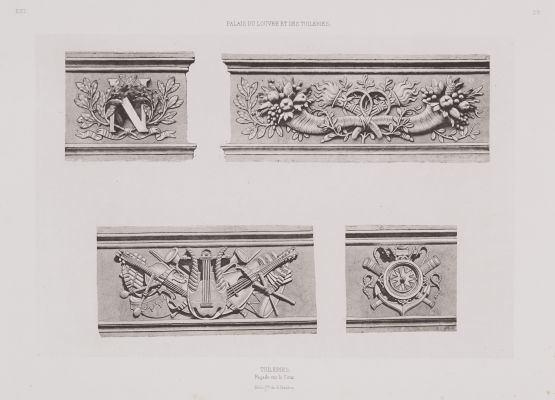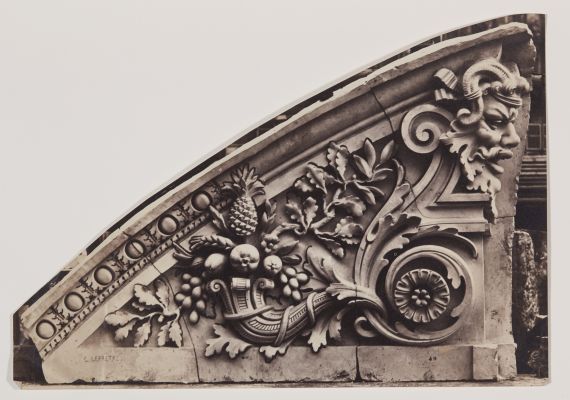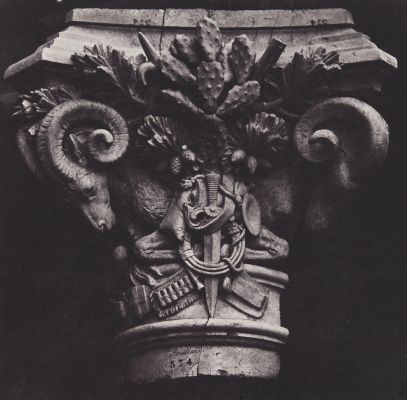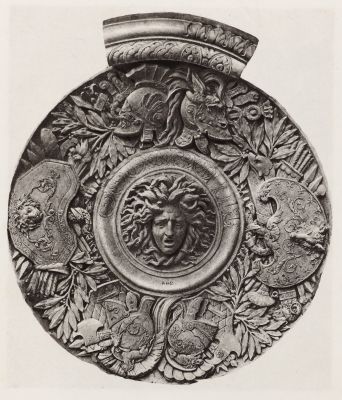
Title
Le Louvre DeatailArtist
Baldus, Edouard (French, 1813-1889)Date
1855Process
Salt PrintAtelier
Baldus, EdouardImage Size
12.2 x 18.5 cm
In 1855, Baldus began photographing on the work site of the New Louvre, documenting for architect Hector Lefuel every piece of statuary and ornamentation made for the vast complex linking the Louvre and Tuileries palaces. As individual records, these photographs served a practical function on the bustling work site, keeping track of the hundreds of plaster models and carved stones sculpted for the project; but as a collected whole, they formed a new means of comprehending and communicating a complex subject, bit by bit, to be reconstituted by the mind. Only photography—precise, omnivorous, prolific, and rapid—and then only in the hands of an artist both sensitive and rigorous—could produce an archive as a new form of art. Baldus’ photographs of the grandest of Napoleon III’s building projects were assembled in albums (four volumes in each set) and presented by the emperor to government ministers, the imperial family, and the reigning monarchs of Europe. [1]
Beginning in the mid-1860s and lasting until the early 1880s – in other words, for more than half his career as a photographer – Baldus’s primary commercial activity centered on the production of photogravures, a process that he had first explored in 1854. An entrepreneur, Baldus saw an opportunity in publishing the Louvre images as a deluxe set of photogravures for sale. This series became Baldus’s first publication containing his own photographs in photogravure and was issued in installments beginning in 1869. His process yielded richly inked, velvety textured prints with an extraordinary clarity and fineness of detail, which he often heightened with etched lines added by hand. The three volumes of Palais du Louvre et des Tuileries, each with 100 plates, parallel the photographic albums made earlier for the minister of state in presenting sculptural and ornamental details as well as few larger architectural views.
Vols. 1-2 were originally issued in 1869-1871; vol. 3 was issued in conjunction with a reissue of the first two vols., all under the title: Palais du Louvre et des Tuileries : motifs de décoration intérieure et extérieure. "The first edition was issued in installments beginning in late 1869, and the series was complete by the end of 1871. Two volumes, each with one hundred plates, focused on interior and exterior decoration. Because of the success of the first two volumes, a third, showing both interior and exterior motifs, was produced, and the three-volume set was published by Morel in 1875. Morel announced publication of the first two installments of the third series in Bibliographie de France on March 20, 1875, and the third and final installment on October 2, 1875." [2]
References
[1] Daniel, Malcom, and Barry Bergdoll. The Photographs of Édouard Baldus. New York: The Metropolitan Museum of Art, 1994. p. 272
[2] ibid , p. 272, note 259 [2]
Daniel, Malcolm. “Édouard Baldus (1813–1889).” In Heilbrunn Timeline of Art History. New York: The Metropolitan Museum of Art, 2000–. http://www.metmuseum.org/toah/hd/bald/hd_bald.htm (October 2004)











